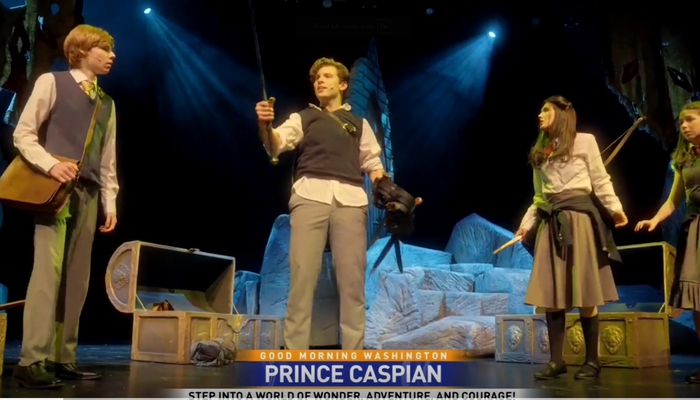We support our Publishers and Content Creators. You can view this story on their website by CLICKING HERE.

Back on November 14, the Washington Post’s Rebecca Ritzel reported on Logos Theatre, a South Carolina theater company “gaining traction” in Washington known for its adaptations of some of C.S. Lewis’s The Chronicles of Narnia books and other works of Christian literature. While people may go to see Logos’ life-sized lion puppet, the Post made sure to warn people that this Christian theater really is Christian.
Ritzel wasted no time trying to paint director Nicole Stratton as a weirdo:
In the recent stage version of “Pilgrim’s Progress” created by Logos Theatre, the Vanity Fair scene features a multicultural parade of 17th century amusements: a maypole, a fortune teller, a tinker’s cart hawking festive wares. The revelers wear long petticoats, velvet pantaloons and carnival masks. All the makings of a late-Renaissance good time, with one exception…
Cleavage. None of the women onstage is wearing the push-up corset or off-the-shoulder bodices that were all the rage in the 1670s because, as director Nicole Stratton explains, ‘We wouldn’t want the audience to stumble.’
Sometimes, to produce Christian theater, you have to strategically alter the necklines.
The piece then turns into a relatively normal history piece, eventually getting to how Logos made its way to the nation’s capital, “Jerry Pattengale, a Christian author who serves as ‘founding scholar’ and senior adviser to Carlos Campo, the [Museum of the Bible’s] CEO, visited the Logos warehouse soon after Hinton and came home convinced that Logos was not a community theater, as they had been told, but a scrappy, student-powered operation with professional-level behind-the-scenes skills. ‘All of a sudden, around the corner came this giant horse. I thought it was a robot. I was not prepared.’ Pattengale said. ‘They told me they had puppets, but no one told me they were life-size.’”
Opening TODAY!#TheChroniclesofNarnia: #TheHorseHisAndHisBoy at Ark Encounter is already looking amazing!
Tickets: https://t.co/Ngpg1fJyjP#TheLogosTheatre #NarniaOnTour #AslanisontheMove pic.twitter.com/0PR4C8S5JJ
— The Logos Theatre (@LogosTheatre) January 10, 2024
After some history on Stratton’s past and future Narnia and Pilgrim’s Progress adaptations, Ritzel turned to Logos belief system. “Logos” is the Greek word for “word” from John 1:1, so it should not be surprising that Logos Theatre subscribes to a Biblical sexual ethic, but apparently it is:
Performing arts organizations in Washington, like so many other theater towns, promote diversity in gender and sexuality, including performers’ pronouns in programs and offering Pride Night ticket discounts. Not Logos, which doesn’t allow LGBTQ performers. Line 12 of the company’s “belief statement” reads, in part: “We believe that any form of sexual immorality, such as adultery, fornication, homosexuality, bisexual conduct, bestiality, incest, pornography or any attempt to change one’s sex, or disagreement with one’s biological sex, is sinful and offensive to God.”
Ritzel cites Fuller Theological Seminary assistant professor of theology and arts Kutter Callaway saying “For most of the last century, churches were more likely to abide by a kind of don’t-ask-don’t-tell policy; everybody might have known the organist was gay, but nobody said anything. ‘What’s new here isn’t necessarily the theological position, but doubling down on outing people,’ Callaway says.’ It’s a bit of a tragedy to me, if now we’re going to create this artistic community exploring creative endeavors, and now we’re making it an exclusive club.’”
The strange argument about the organist notwithstanding, Logos’ belief statement on sexual morality reads like any other statement you would expect from a Christian organization’s terms of employment. In the meantime, anyone in the Taylors, South Carolina, D.C., or any other areas that Logos Theatre tours in should make time to see one of their plays.

 Conservative
Conservative  Search
Search Trending
Trending Current News
Current News 





